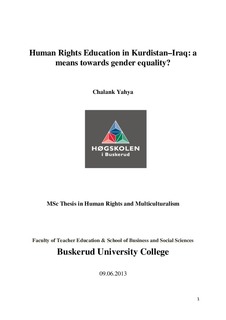| dc.description.abstract | This thesis examines education professionals’ perceptions of the potential role of Human Rights Education (HRE) as a means towards gender equality in Iraqi Kurdistan. HRE is understood as a cosmopolitan project. The key research questions are: a) how can HRE contribute to gender equity in the post-conflict and multicultural society of Iraqi Kurdistan? and b) how do education professionals understand human rights and HRE and its potential in Kurdish society? The data was gathered during fieldwork visits in July 2011 and February 2012 to Erbil governorate by means of a range of qualitative methods including interviews with education professionals and NGO workers; classroom observations and documentary sources. Martha Nussbaum’s and Amartya Sen’s capability approach is adopted as the theoretical framework within which the data is analysed. The professionals report on recent initiatives to reform the Kurdish education system, including the introduction of HRE into the curriculum. They describe the poor status of school facilities and lack of material and human resources in meeting current education demands, meaning that children’s human rights are not necessarily guaranteed at school. When it comes to HRE, it is perceived as low-status. Human rights are taught without adequate consideration of or familiarity with children’s rights. HRE operates in a setting where there is tension between knowing rights in theory and being able to enjoy these rights in practice, including equitable gender relationships. This thesis concludes that for HRE to be effective, teaching methods need to focus on student participation and empowerment, where the focus is on facilitating the development of self-empowerment and critical thinking (capability approach) so as to enable learners to both understand and to experience human rights, including the key concepts of equality and inclusion central to positive gender relationships. | nb_NO |
